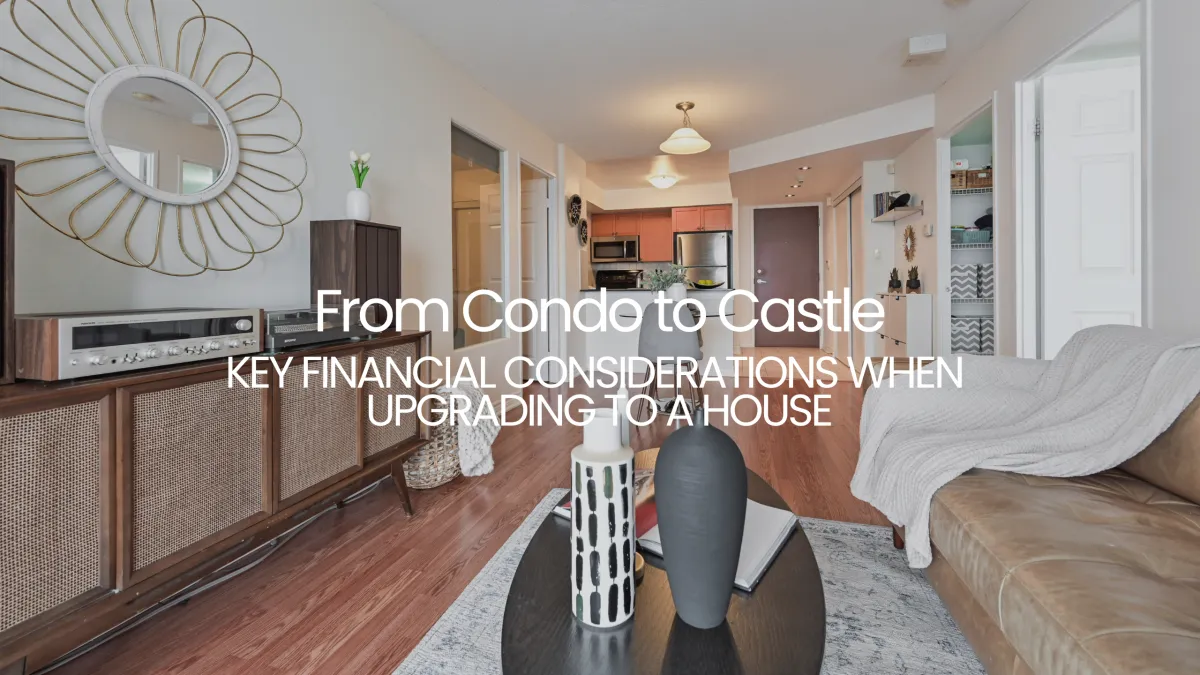
From Condo to Castle: Key Financial Considerations When Upgrading to a House
Moving from a cozy condo in Toronto to a spacious house in the suburbs is an exciting adventure. However, it comes with financial considerations that should not be overlooked. Let's dive into how you can prepare for this big change and make the process as smooth as possible.
How to Financially Prepare for the Transition from a Condo to a House
Savings: Building Your Castle Fund
When thinking about upgrading from a condo to a house, the first step is to build your savings. Here's how:
1. Set a Savings Goal: Understand how much money you'll need for the down payment, closing costs, and moving expenses. Typically, you should aim to save at least 20% of the house price for the down payment to avoid mortgage insurance.
2. Create a Savings Plan: Break down your total savings goal into monthly targets. If you need to save $50,000 over two years, you would need to save about $2,083 per month.
3. Cut Unnecessary Expenses: Look at your monthly spending and find areas where you can cut back. This could be eating out less often or canceling subscription services you don't use.
4. Automate Savings: Set up automatic transfers to a dedicated savings account. This ensures you are consistently adding to your house fund without thinking about it.
Budgeting: Planning for Your New Financial Reality
Budgeting is crucial when moving to a larger home. Here's how to create a comprehensive budget plan:
1. Estimate Monthly Costs: Understand your monthly expenses in your new home. This includes mortgage payments, property taxes, insurance, utilities, and maintenance.
2. Current vs. Future Budget: Compare your current condo living expenses with your future house expenses. This helps you understand how much more you will need each month.
3. Emergency Fund: Set aside money for unexpected expenses, like repairs or sudden changes in income. A good rule of thumb is to save three to six months' worth of living expenses.
4. Track Your Spending: Use budgeting apps or spreadsheets to track your spending and ensure you are sticking to your budget.
Unexpected Costs: Preparing for the Surprises
Many new homeowners are surprised by costs they didn't expect. Here are some common ones:
1. Home Inspection: Before buying, hire a professional to inspect the house. This can cost a few hundred dollars but could save you thousands in repairs later.
2. Renovations and Repairs: Even move-in-ready homes may need some fixes. Be prepared for costs like painting, fixing leaks, or upgrading old appliances.
3. Landscaping and Exterior Maintenance: Owning a house often means taking care of a yard. Budget for lawn care, snow removal, and other outdoor maintenance.
4. Utilities and Services: Houses often have higher utility bills than condos. You may also need to pay for services like trash collection or pest control.
5. Property Taxes and Home Insurance: These costs can vary widely depending on the location and value of your new home. Make sure to research and budget for them.
From Condo to Castle: Key Financial Considerations When Upgrading to a House
Understanding the Toronto Housing Market
Toronto's housing market can be quite competitive. Here's what you need to know:
1. Market Trends: Research current market trends. Are house prices rising or falling? Knowing this helps you determine the best time to buy.
2. Neighborhood Comparisons: Compare different suburban neighborhoods. Look at factors like school quality, crime rates, and amenities. This helps you find a location that fits your lifestyle and budget.
3. Work with a Real Estate Agent: A local real estate agent can provide valuable insights and help you navigate the market. They can also help you find homes that meet your criteria.
Getting Pre-Approved for a Mortgage
Being pre-approved for a mortgage gives you a clear idea of your budget and shows sellers you are a serious buyer. Here's how to get pre-approved:
1. Check Your Credit Score: A good credit score helps you get better mortgage rates. Check your score and fix any errors before applying.
2. Gather Financial Documents: Lenders will need documents like pay stubs, tax returns, and bank statements. Have these ready to speed up the process.
3. Shop Around for Lenders: Different lenders offer different rates and terms. Compare offers to find the best deal.
4. Understand Your Mortgage Options: There are many types of mortgages, such as fixed-rate and variable-rate. Understand the pros and cons of each before deciding.
Selling Your Condo: Maximizing Your Return
Selling your current condo involves several steps. Here's how to get the most out of your sale:
1. Set the Right Price: Use comparable sales in your area to price your condo competitively. Too high, and it may sit on the market; too low, and you could lose money.
2. Stage Your Condo: Make your condo appealing to buyers. Clean thoroughly, declutter, and make minor repairs. Consider hiring a professional stager to highlight its best features.
3. Market Effectively: High-quality photos and descriptions are key. Use online listings, social media, and open houses to reach potential buyers.
4. Negotiate Offers: Review offers carefully and be prepared to negotiate. Your real estate agent can help you evaluate offers and make counteroffers.
Moving and Settling In: Final Steps
Once you've sold your condo and bought your new house, it's time to move and settle in:
1. Hire a Moving Company: Get quotes from several moving companies and choose one that fits your budget. Make sure to check reviews and ask for recommendations.
2. Update Your Address: Notify important contacts of your move. This includes the post office, banks, utilities, and insurance companies.
3. Set Up Utilities: Arrange for utilities to be connected before you move in. This includes electricity, gas, water, internet, and cable.
4. Plan for the First Few Weeks: Moving can be hectic. Plan for meals, pet care, and other essentials for the first few weeks in your new home.
Upgrading from a condo to a house in Toronto's suburbs is a big step, but with careful planning and financial preparation, it can be a smooth transition. Follow these guidelines to ensure you are ready for your new home.


Royal Lepage Signature Realty
(647) 492-1880
495 Wellington St. W. #100 Toronto, ON M5V 1E9
Copyright 2024 Q Real Estate Group - All rights reserved. Toronto Regional Real Estate Board (TRREB) assumes no responsibility for the accuracy of any information shown. The information provided herein must only be used by consumers that have a bona fide interest in the purchase, sale or lease of real estate and may not be used for any commercial purpose or any other purpose.
Privacy Policy | Cookie Policy | Property Listings | Sitemap | Accessibility
The data relating to real estate on this web site comes in part from the Internet Data Exchange (IDX) program of the Toronto Real Estate Board. The information herein is believed to be accurate and timely, but no warranty as such is expressed or implied. The information provided herein must only be used by consumers that have a bona fide interest in the purchase, sale, or lease of real estate and may not be used for any commercial purpose or any other purpose. IDX information is provided exclusively for consumers’ personal, non-commercial use and that it may not be used for any purpose other than to identify prospective properties consumers may be interested in purchasing. Information deemed reliable but not guaranteed to be accurate. Listing information updated daily.
